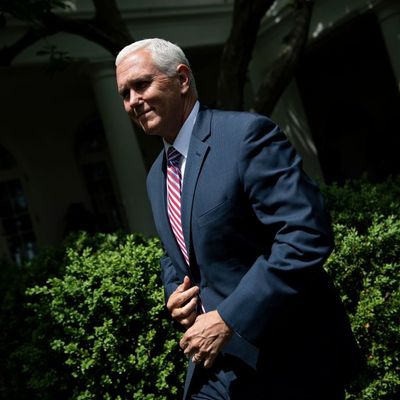
The last time Mike Pence spoke in front of an audience at Liberty University was in October 2016 — the week after the release of the Access Hollywood tape. He called for the evangelical crowd to “forgive” the Republican candidate and to “choose to stand with Donald Trump.” The students weren’t exactly buying it: Though the crowd applauded when Pence promised to defund Planned Parenthood, there was scattered applause for his moral endorsement of the nominee.
Almost three years later, Pence returned to give the commencement speech for the class of 2019. Speaking “not so much as your vice-president but as a brother in Christ,” he told the young evangelicals they should “be ready” to be made fun of for their Christian values in the world beyond campus. “Some of the loudest voices for tolerance today have little tolerance for traditional Christian beliefs,” Pence said. “Throughout most of American history, it’s been pretty easy to call yourself Christian. It didn’t even occur to people that you might be shunned or ridiculed for defending the teachings of the Bible. But things are different now.”
The vice-president is most likely referring to the recent criticism he’s drawn from Democratic candidate Pete Buttigieg, an openly gay, observant Christian who recently called out the vice-president by name over his prejudicial views: “That’s the thing I wish the Mike Pence’s of the world would understand. That if you got a problem with who I am, your problem is not with me. Your quarrel, sir, is with my creator.” In April, the South Bend mayor also questioned how Pence could endorse the president: “Is it that he stopped believing in Scripture, when he started believing in Donald Trump?”
Pence’s remarks — mistaking ridicule for call-outs on certain hypocrisies — are consistent with the Christian persecutionist views of modern evangelicals, who believe that religious Americans are marginalized or under attack for their beliefs. A recent Morning Consult poll shows that the rhetoric like the vice-president shared at Liberty University is landing with evangelicals: “They were the most likely of any group surveyed to say they’d have less influence on social and political matters in the next 10 years.”
As New York’s Ed Kilgore notes, Christians around the world do face serious oppression, but they’re not white American evangelicals; that unfortunate designation is owned by Christians in Sri Lanka, Pakistan, Nigeria, and the Central African Republic. Black parishioners in central Louisiana, where a white 21-year-old allegedly burned down three churches in 10 days this spring, may also have something to say to white evangelicals who claim persecution for their status in America.






























